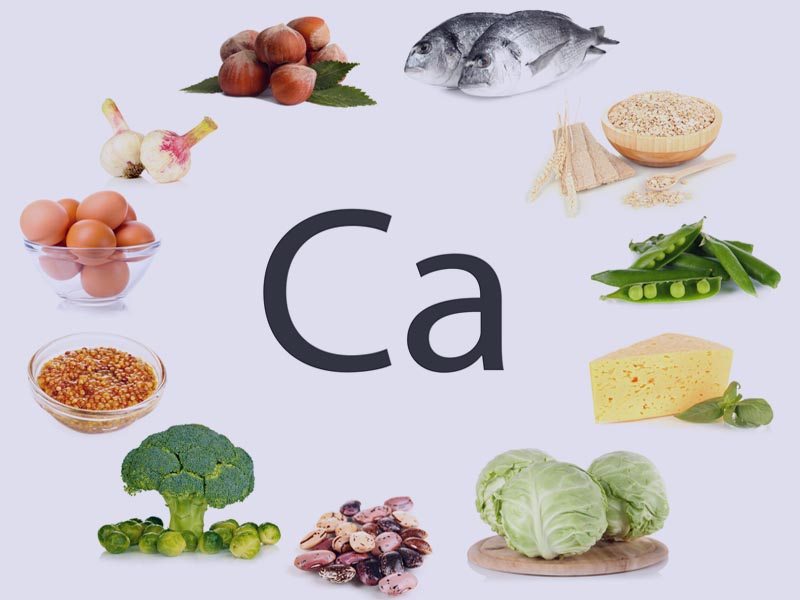We all know calcium is important for maintaining strong bones, 99% of the calcium is stored in bones and teeth. Calcium plays important role in normal blood clotting, muscle contraction and functioning , conduction of nerve impulses or nerve signals, regulating fluid balance, regulating blood pressure as it aids in contract an dilate of blood vessels , reduced colon cancer risk and aids in reducing PMS.
Calcium is vital and when its requirement not met by diet, the body draws calcium from bones and if this process carries on for a while calcium levels are depleted and resulting bone loss which ultimately results in Osteoporosis
Research shows that Osteoporosis affects 9 million women, mostly postmenopausal women, making the bones weak and more likely prone to fracture. In addition research shows that 34 million women are estimated to have bone loss that puts them at risk for osteoporosis. Optimal calcium intake is essential in maintaining bone strength.
How much calcium is required by you?
| SEX | AGE | RDI |
| MEN | 19-70 | 1000mg |
| 70+ | 1300mg | |
| WOMEN | 19-50 | 1000mg |
| Source of Calcium In Food |
| Dairy – milk, buttermilk, cheese, yoghurt |
| Fish – sardines and salmon |
| Calcium-Fortified Foods – breakfast cereals, fruit juice and bread |
| Green leafy vegetables – broccoli, okra, spinach, kale, bok choy |
| Pinto beans, Cabbage , sweet potato , soya beans, chickpeas, tofuNuts and Seeds – almonds, Brazil nuts, sesame seeds, chia seeds, hemp seedsAmaranth , black berries, blackcurrants , oranges, figsAlmond milk ,soya Milk ,Hemp Milk |
Calcium Absorption
Vitamins that are needed for calcium absorption:
- Vitamin D is needed for calcium absorption.
- Vitamin K – research shows that not getting enough vitamin K from the diet may lead to weaker bones, which increases risk of stress fracture. Vitamin K has also been shown to reduce bone loss by keeping calcium in your bones.
Foods that hinder calcium absorption:
- Salt – a diet high in salt has been shown to speed up bone loss. Research shows that for every 2000mg of sodium removed by the kidneys in the urine 60mg calcium is excreted.
- Caffeine – a large intake of caffeine acts as a diuretic and flushes more calcium through the kidneys. Ex: coffee, cola and tea.
- Soda drinks – research also shows that fizzy drinks are associated with softer bones and a higher risk of stress fracture.
- Excessive alcohol – alcohol inhibits the stomach’s ability to absorb calcium adequately. Alcohol also shown to interfere with the pancreas and its absorption of calcium and vitamin D.
Types of calcium supplement:
| Calcium Type | Pros | Cons |
| Calcium citrate 21% calcium | This is very easily absorbed | It is most expensive; doesn’t contain much elemental calcium |
| Calcium carbonate | This is least expensive; and has more elemental calcium | Must be taken with meals or glass of acidic (orange) juice; may cause gas or constipation |
Precautions: Don’t take more than 1,200 mg of calcium (in supplement form) a day unless instructed by a doctor or a dietitian.
Calcium is vital and when its requirement not met by diet, the body draws calcium from bones and if this process carries on for a while calcium levels are depleted and resulting bone loss which ultimately results in Osteoporosis
Research shows that Osteoporosis affects 9 million women, mostly postmenopausal women, making the bones weak and more likely prone to fracture. In addition research shows that 34 million women are estimated to have bone loss that puts them at risk for osteoporosis. Optimal calcium intake is essential in maintaining bone strength.
How much calcium is required by you?
| SEX | AGE | RDI |
| MEN | 19-70 | 1000mg |
| 70+ | 1300mg | |
| WOMEN | 19-50 | 1000mg |
| Source of Calcium In Food |
| Dairy – milk, buttermilk, cheese, yoghurt |
| Fish – sardines and salmon |
| Calcium-Fortified Foods – breakfast cereals, fruit juice and bread |
| Green leafy vegetables – broccoli, okra, spinach, kale, bok choy |
| Pinto beans, Cabbage , sweet potato , soya beans, chickpeas, tofuNuts and Seeds – almonds, Brazil nuts, sesame seeds, chia seeds, hemp seedsAmaranth , black berries, blackcurrants , oranges, figsAlmond milk ,soya Milk ,Hemp Milk |
Calcium Absorption
Vitamins that are needed for calcium absorption:
- Vitamin D is needed for calcium absorption.
- Vitamin K – research shows that not getting enough vitamin K from the diet may lead to weaker bones, which increases risk of stress fracture. Vitamin K has also been shown to reduce bone loss by keeping calcium in your bones.
Foods that hinder calcium absorption:
- Salt – a diet high in salt has been shown to speed up bone loss. Research shows that for every 2000mg of sodium removed by the kidneys in the urine 60mg calcium is excreted.
- Caffeine – a large intake of caffeine acts as a diuretic and flushes more calcium through the kidneys. Ex: coffee, cola and tea.
- Soda drinks – research also shows that fizzy drinks are associated with softer bones and a higher risk of stress fracture.
- Excessive alcohol – alcohol inhibits the stomach’s ability to absorb calcium adequately. Alcohol also shown to interfere with the pancreas and its absorption of calcium and vitamin D.
Types of calcium supplement:
| Calcium Type | Pros | Cons |
| Calcium citrate 21% calcium | This is very easily absorbed | It is most expensive; doesn’t contain much elemental calcium |
| Calcium carbonate | This is least expensive; and has more elemental calcium | Must be taken with meals or glass of acidic (orange) juice; may cause gas or constipation |
Precautions: Don’t take more than 1,200 mg of calcium (in supplement form) a day unless instructed by a doctor or a dietitian.

Ms. Laxmi Pandrala
CEO Founder Lami.fit
Sports and Exercise Nutritionist


